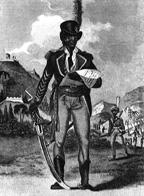How Haiti Saved the United States
Not a slave himself, Toussaint nonetheless trained and led the half million African slaves on Haiti to victory after victory, over England and France, for more than a decade. In the process, he kept America free from European domination. In 1791, the new country of the United States of America was just getting on its feet. George Washington would run for re-election that year, and the two great political parties (Federalist and Democratic-Republican) were angling to get their men into top positions in government yet again. The western borders of the country were ever expanding, as was the number of states admitted into the Union. Bad for the fledgling country, though, was the presence of European troops all around:
Europeans had been bringing African slaves to America and the surrounding area since 1619. By 1791, the slavery system was so ingrained in the lifestyles of both Europeans and Africans that it seemed like it could go on indefinitely. At least that's what the Europeans thought. The Africans saw it differently. And in 1791, they rose up in defiance of their captors. The place was Saint Domingue (Haiti), a small Caribbean island then owned by France. This was France's wealthiest colony, and that wealth came almost exclusively from the plantations that were worked by African slaves. Next page > The Haitian Revolt > Page 1, 2, 3 |
|
Social Studies for Kids
copyright 2002–2026
David White



 A
slave revolt in Haiti saved the United States. How did it
happen? Largely through the efforts of one man: Toussaint
L'Overture.
A
slave revolt in Haiti saved the United States. How did it
happen? Largely through the efforts of one man: Toussaint
L'Overture.
 The
potential for European involvement in American affairs was
high. President Washington and other government officials
met with European officials time and again, trying to keep
the peace and keep American out of European wars. But the
more America refused to fight, the more both sides in a war
came to hate America.
The
potential for European involvement in American affairs was
high. President Washington and other government officials
met with European officials time and again, trying to keep
the peace and keep American out of European wars. But the
more America refused to fight, the more both sides in a war
came to hate America.

